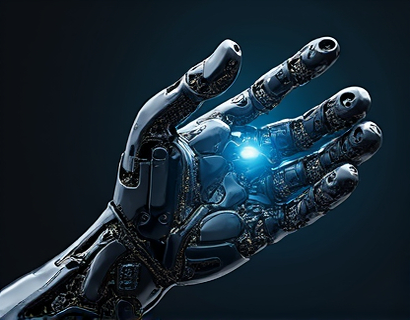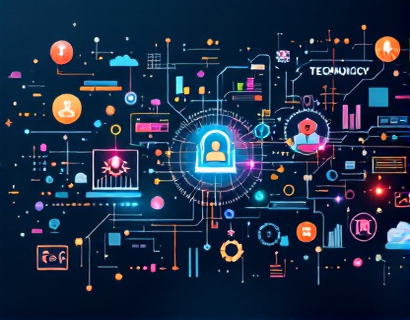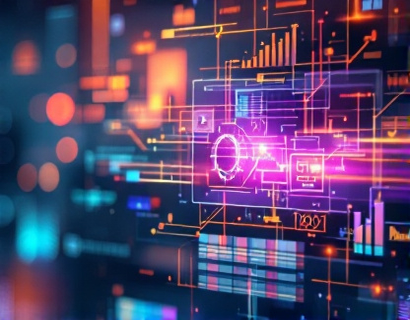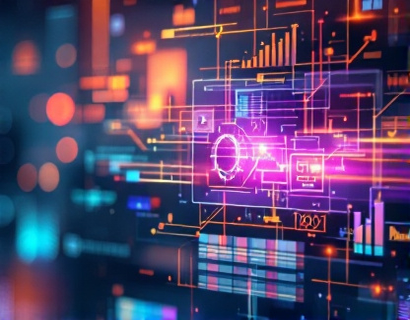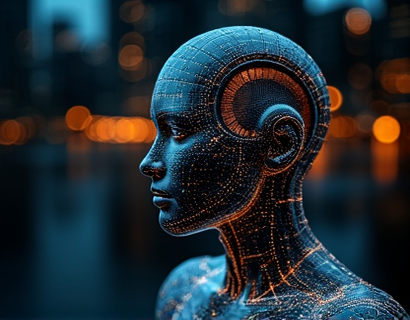Revolutionizing Digital Services: The Synergy of Crypto and AI
The integration of cryptocurrency and artificial intelligence is ushering in a new era of digital services, transforming how users interact with applications and platforms. This synergy is not just about combining two advanced technologies but about creating a seamless, secure, and highly personalized user experience. As we delve into the latest advancements, it becomes evident that the convergence of crypto and AI is redefining the landscape of digital services, offering unprecedented opportunities for innovation and enhanced user interactions.
Understanding the Basics: Cryptocurrency and Artificial Intelligence
Cryptocurrency, often referred to as digital or virtual currency, operates on a decentralized network known as a blockchain. This technology ensures transparency, security, and immutability, making it an ideal foundation for various financial and non-financial applications. On the other hand, artificial intelligence involves the simulation of human intelligence processes by machines, particularly computer systems. These processes include learning, reasoning, and self-correction, enabling AI to perform tasks that traditionally required human intervention.
The intersection of these two technologies is particularly potent. Cryptocurrency provides a secure and transparent medium for transactions, while AI enhances the functionality and user experience of applications built on blockchain. Together, they create a robust framework for developing innovative digital services that are not only secure but also intelligent and user-centric.
Enhanced Security through Crypto and AI
One of the most significant benefits of combining cryptocurrency and AI is the enhancement of security measures. Traditional digital services often struggle with security breaches and data leaks, which can erode user trust. By leveraging blockchain technology, transactions are recorded in a tamper-proof ledger, reducing the risk of fraud and unauthorized access. AI further fortifies this security by implementing advanced algorithms to detect and prevent anomalies in real-time.
For instance, AI-driven systems can analyze patterns in transaction data to identify suspicious activities, such as unusual login times or locations. These systems can automatically trigger alerts or even halt transactions to prevent potential security breaches. This proactive approach to security not only protects user data but also builds confidence in digital services, encouraging more widespread adoption.
Personalized User Experiences with AI
AI's ability to process and analyze vast amounts of data makes it an invaluable tool for creating personalized user experiences. In the context of cryptocurrency and digital services, AI can tailor recommendations, interfaces, and functionalities based on individual user preferences and behaviors. This level of personalization is crucial in a market where user engagement and satisfaction are key to success.
For example, a crypto-based financial platform can use AI to analyze a user's transaction history, investment preferences, and risk tolerance to provide customized investment suggestions. Similarly, a decentralized application (dApp) can use AI to adapt its user interface based on the device and browser being used, ensuring a smooth and intuitive experience across different platforms.
Smart Contracts and Automated Processes
Smart contracts, self-executing contracts with the terms directly written into code, are another area where crypto and AI converge to revolutionize digital services. These contracts automatically enforce and execute agreements when predefined conditions are met, eliminating the need for intermediaries and reducing transaction costs.
AI can further optimize smart contracts by predicting potential issues and suggesting improvements. For instance, AI algorithms can analyze historical data to identify patterns that may lead to contract failures or inefficiencies. By integrating AI into the smart contract development process, developers can create more robust and reliable contracts, enhancing the overall user experience.
Decentralized Finance (DeFi) and AI-Driven Innovations
Decentralized Finance (DeFi) is a prime example of how crypto and AI are transforming traditional financial services. DeFi platforms offer a range of financial products, including lending, borrowing, and trading, all built on blockchain technology. AI plays a crucial role in enhancing these platforms by providing sophisticated risk management tools and predictive analytics.
AI can analyze market trends and user behavior to forecast financial outcomes, helping users make informed decisions. For instance, AI-driven algorithms can predict price movements in decentralized exchanges, enabling users to optimize their trading strategies. Additionally, AI can automate complex financial tasks, such as portfolio management, reducing the need for human intervention and minimizing errors.
Supply Chain Transparency and Traceability
Beyond financial services, the combination of crypto and AI is also transforming supply chain management. By using blockchain to create an immutable record of transactions, businesses can ensure transparency and traceability throughout the supply chain. AI enhances this process by analyzing data from various sources to identify bottlenecks, optimize logistics, and ensure compliance with regulations.
For example, a supply chain platform can use blockchain to track the origin and movement of goods, providing consumers with verifiable information about the products they purchase. AI can further analyze this data to predict demand, optimize inventory levels, and reduce waste. This synergy not only improves efficiency but also promotes sustainability and ethical practices in business operations.
Healthcare and Medical Applications
The healthcare sector is another area where the integration of crypto and AI is making a significant impact. Blockchain can secure patient data, ensuring privacy and compliance with regulations like the General Data Protection Regulation (GDPR). AI, on the other hand, can analyze medical data to assist in diagnosis, treatment planning, and drug discovery.
For instance, a healthcare platform can use blockchain to store and manage patient records, allowing for secure and seamless sharing of information between healthcare providers. AI algorithms can process this data to identify patterns and insights, aiding doctors in making more accurate diagnoses. Additionally, AI can help in the development of personalized treatment plans by analyzing a patient's genetic information and medical history.
Challenges and Considerations
While the potential of crypto and AI in digital services is immense, there are several challenges that need to be addressed. One of the primary concerns is the regulatory landscape. As these technologies continue to evolve, governments and regulatory bodies are grappling with how to create frameworks that balance innovation with consumer protection. Ensuring compliance while fostering a conducive environment for development is a delicate balance.
Another challenge is the technical complexity involved in integrating crypto and AI. Developers need a deep understanding of both technologies to create effective and secure applications. This requires a skilled workforce and significant investment in research and development. Additionally, there is the issue of scalability, as blockchain networks can face performance bottlenecks when handling a high volume of transactions.
Future Prospects: The Next Generation of Digital Services
Looking ahead, the future of digital services powered by crypto and AI is promising. As technology continues to advance, we can expect even more innovative applications that enhance user experiences and drive efficiency. The convergence of these technologies is likely to lead to the development of new industries and business models, creating opportunities for entrepreneurs and tech enthusiasts alike.
Moreover, the increasing adoption of 5G and the Internet of Things (IoT) will further accelerate the integration of crypto and AI. With faster and more reliable connectivity, the potential for real-time data processing and smart device interactions will expand, opening up new possibilities for decentralized applications and services.
In conclusion, the synergy between cryptocurrency and artificial intelligence is revolutionizing digital services, offering enhanced security, personalized experiences, and efficient processes. As these technologies continue to evolve, they will play a pivotal role in shaping the future of how we interact with digital platforms and applications.








